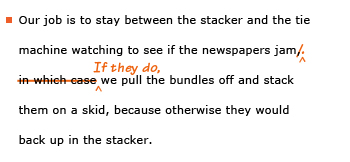Ineffective subordination
If a sentence buries its major idea in a subordinate construction, readers may not give the idea enough attention. Express the major idea in an independent clause and subordinate any minor ideas.

The writer wanted to focus on the promise to stop climate change, but the original sentence buried this idea in an adjective clause. The revision puts the major idea in an independent clause and tucks the less important idea into an adjective clause (who swept . . .).


The less important idea (what the attendant noticed) has become a participial phrase, while the important action (the diet change) takes over the independent clause.
Excessive subordination
In attempting to avoid short, choppy sentences, writers sometimes move to the opposite extreme, putting more subordinate ideas into a sentence than its structure can bear. If a sentence collapses of its own weight, occasionally it can be restructured. More often, however, such sentences must be divided.

Exercise: Identifying coordination
Exercise: Identifying subordination
Exercise: Identifying sentence emphasis 1
Exercise: Identifying sentence emphasis 2
Exercise: Combining choppy sentences
Exercise: Using coordination and subordination 1
Exercise: Using coordination and subordination 2
Exercise: Using coordination and subordination 3
independent clause A word group containing a subject and a verb that can or does stand alone as a sentence.